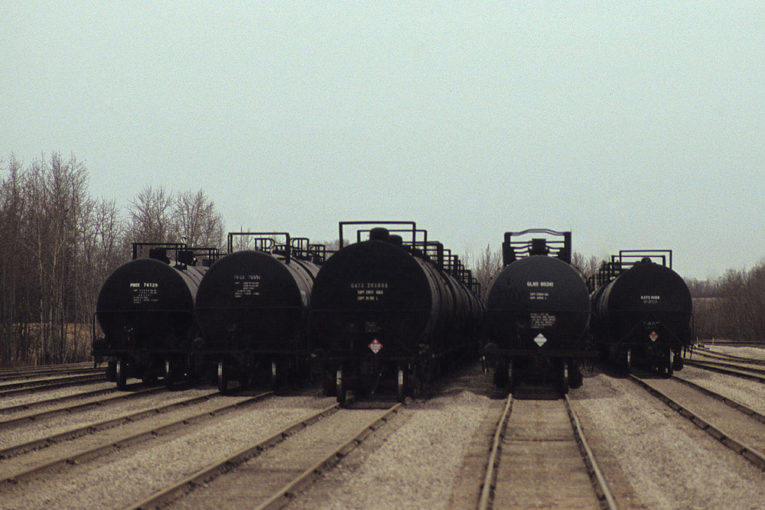
CALGARY – Imperial Oil Ltd. blasted the Alberta government Friday for forcing companies to curtail oil production in the province, calling the move a “drastic, dramatic manipulation in the market” that has made crude-by-rail shipments uneconomic.
With the stroke of a pen, the government began picking winners and losers
Rich Kruger, CEO of Imperial Oil
“We think investor confidence in Canada is damaged at a time when we already had confidence issues in Canada,” CEO Rich Kruger said, adding the curtailment order has caused Imperial to reconsider the timing of the $2.6-billion Aspen oilsands project it green-lighted last year.
Alberta Premier Rachel Notley announced in December that large oil producers would need to scale back production by a total of 325,000 barrels of oil per day in a bid to lift Western Canada Select heavy oil prices, which at the time were subject to crippling US$40-per-barrel discounts relative to U.S. benchmarks.
Imperial, which has invested in refineries that can profit from the spread between heavy blends and gasoline or diesel prices, opposed the order, alongside integrated companies such as Suncor Energy Inc. and Husky Energy Inc.
“With the stroke of a pen, the government began picking winners and losers,” Kruger said, adding curtailment affects 28 out of 421 producers in the province.
Most significantly, he said the curtailment order would have the unintended consequence of keeping more oil in storage because companies such as Imperial would ship less on railway cars.
Canadian oil companies need a discount of between US$15 per barrel and US$20 per barrel to justify the cost of shipping oil by rail but the discount has been below that range since the order came into effect.
On Thursday, AltaCorp Capital data shows the discount between WCS and West Texas Intermediate is an average of US$9.44 per barrel.
Before the curtailment order came into effect, Imperial was shipping about half of the total volume of crude on railway cars out of Canada. It shipped 168,000 bpd on rails in December but has since “unwound” its crude-by-rail volumes.
The company shipped an average of 90,000 bpd on rails in January and expects to ship “at or near” zero barrels on railways cars in February.
“Crude by rail should be helping to alleviate this situation in the province but because of the drastic, dramatic manipulation in the market, takeaway capacity is now being idled,” Kruger said.
Mike McKinnon, a spokesperson for Alberta Energy Minister Marg McQuaig-Boyd, said Friday: “The decision to temporarily limit oil production was applied fairly and equitably, and has been instrumental in saving jobs across the energy sector.
“We expect the differential to settle at a more sustainable level and we continue moving forward with long-term solutions like our investment in rail and our continued fight to build pipelines,” he said.
Many Calgary-based oil companies without downstream refineries supported the decision to curtail oil production in a bid to lift WCS prices, and therefore provincial government royalty revenues.
“When we made the decision to curtail, we knew at the very outset that it was a big decision, it was a bold decision, and it was a difficult one because not everyone agreed,” Notley said this week.
On Wednesday, the province eased the curtailment order by 75,000 bpd, saying the order has had the effect of reducing the amount of crude in storage in the province by 5 million barrels to a total of 30 million barrels.
Still, Kruger said the curtailment order has shaken his confidence in the market because there is no guarantee a similar order can’t be issued again.
“We’re re-evaluating our assumptions,” Kruger said, adding that the timing for the company’s 75,000 bpd Aspen oilsands project could be reconsidered in light of the order.
However, the company did not update its planned capital spending for 2019 during its earnings call Friday.
“As one of the few Canadian companies increasing spending levels heading into 2019, Imperial will likely benefit from its counter-cyclical strategy as it looks for cost improvements on major projects,” National Bank Financial analyst Travis Wood said in a research note.
He noted that Imperial’s fourth-quarter results beat analysts’ expectations thanks mostly to its refining assets.
Imperial earned $853 million in the quarter of 2018, a dramatic 990 per cent improvement over the $137-million net loss it posted during the same period a year earlier.
Those improved earnings were on the back of only marginally higher output, as Imperial’s total oil and gas production averaged 431,000 barrels of oil equivalent per day in the fourth quarter, up 8 per cent from the 399,000 boe/d it pumped at the same time in 2017.
• Email:
You can read more of the news on source
